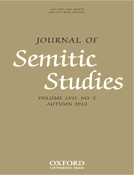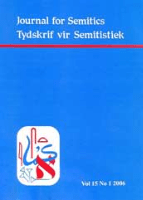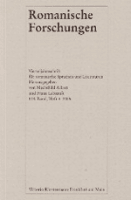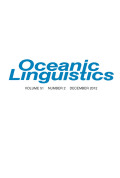
JOURNAL OF SEMITIC STUDIES
metrics 2024
Exploring the Depths of Semitic Heritage
Introduction
JOURNAL OF SEMITIC STUDIES, published by Oxford University Press, is a premier academic journal that has served as a vital platform for interdisciplinary research in the fields of Semitic languages, history, culture, and religion since its inception in 1956. With a distinguished impact factor and a significant presence in various academic quartiles, including Q1 rankings in History and Literature, this journal is essential for scholars and practitioners seeking to advance their understanding of Semitic studies. The journal's scope includes comprehensive research articles, critical essays, and reviews that contribute to ongoing dialogues in Cultural Studies, Linguistics, and Religious Studies, making it indispensable for researchers, educators, and students alike. Although it currently does not offer open access, the high-quality, peer-reviewed content ensures rigorous academic standards while maintaining engagement with current trends and discussions in its respective fields. As a hub for innovative and influential scholarship, the JOURNAL OF SEMITIC STUDIES continues to foster an environment that encourages exploration and discovery within the rich tapestry of Semitic languages and cultures.
Metrics 2024
 0.22
0.22 0.30
0.30 0.30
0.30 17
17Metrics History
Rank 2024
Scopus
JCI (Web Of Science)
Quartile History
Similar Journals

Studi Slavistici
Connecting Scholars Through Open Access ResearchStudi Slavistici is an esteemed academic journal published by FIRENZE UNIV PRESS, focusing on the rich and diverse fields of Cultural Studies, Linguistics and Language, and Literature and Literary Theory. Since its initiation in 2004, it operates under an Open Access model, providing unrestricted access to its contents and fostering a wider dissemination of research. Based in Italy, this journal serves as a vital platform for scholars and researchers engaged in Slavic studies and beyond, encouraging interdisciplinary dialogue and innovative approaches. With its current Quartile rankings in the Q4 category across various domains, it plays a significant role in shaping dialogues within the academic community while offering insights into contemporary and historical perspectives. By maintaining an inclusive vision and engaging with critical issues, Studi Slavistici remains dedicated to advancing knowledge and scholarship in these intricate fields.

Miscelanea de Estudios Arabes y Hebraicos-Seccion Hebreo
Unlocking Knowledge in Arabic and Hebrew Studies Since 1955Miscelanea de Estudios Arabes y Hebraicos-Seccion Hebreo is a distinguished interdisciplinary journal published by Universidad de Granada, Editorial, focusing on the intricate fields of Arabic and Hebrew studies. Established in 1955, this open-access journal promotes scholarly discourse and research, allowing free access to its articles, which enhances the dissemination of knowledge. With an ISSN of 1696-585X and an E-ISSN of 2340-2547, the journal has garnered attention in various academic categories, reflecting its relevance and impact: achieving Q2 rankings in both Literature and Literary Theory and Religious Studies, as well as a Q3 ranking in Cultural Studies and History as of 2023. Operating from its base in Granada, Spain, Miscelanea de Estudios Arabes y Hebraicos-Seccion Hebreo contributes significantly to the advancement of cultural understanding, and its accessibility since its inception underscores its commitment to fostering academic excellence. Researchers, professionals, and students interested in the rich interplay between linguistic, cultural, and historical contexts will find this journal an invaluable resource for their studies.

Journal for Semitics
Unveiling New Perspectives on Semitic Literature and LinguisticsJournal for Semitics
Published by UNISA PRESS, the Journal for Semitics is a pivotal platform dedicated to the interdisciplinary study of Semitic languages, literature, and cultures. With its ISSN 1013-8471, this journal provides a comprehensive forum for scholars to disseminate original research, critical reviews, and theoretical discussions that enrich our understanding of Semitic studies in a global context. Although the journal does not currently offer Open Access options, its meticulous peer-review process ensures high-quality scholarship that resonates with academic standards in the field. Flanked by a notable commitment to cultural and linguistic diversity, the Journal for Semitics is essential for researchers, professionals, and students striving to expand their knowledge and engage actively in contemporary Semitic scholarship. Located in Pretoria, South Africa, this journal encapsulates a rich academic tradition while aiming to shape future discourse in Semitic studies.

Sibirskii Filologicheskii Zhurnal
Illuminating the Depths of Language and Literary TheorySibirskii Filologicheskii Zhurnal is a prestigious academic journal published by the Russian Academy of Sciences, Institute of Cytology and Genetics. With ISSN 1813-7083, it is dedicated to advancing research in the fields of Cultural Studies, Linguistics and Language, and Literature and Literary Theory, and has achieved notable rankings, including Q2 in Cultural Studies and Linguistics, and Q1 in Literature for 2023. The journal provides a platform for scholarly discourse, contributing valuable insights to its fields with an evolving scope that spans from 2018 to 2024. Though not an open-access journal, Sibirskii Filologicheskii Zhurnal serves as a vital resource for researchers, professionals, and students in the Russian Federation and beyond, fostering a deeper understanding of linguistic and literary phenomena. Its commitment to high-quality content makes it an essential addition to any academic's library.

ROMANISCHE FORSCHUNGEN
Innovating Research in Romance LinguisticsROMANISCHE FORSCHUNGEN, published by VITTORIO KLOSTERMANN GMBH, stands as a key scholarly journal in the fields of linguistics and literary studies, focusing particularly on Romance languages and literature. With an ISSN of 0035-8126 and an E-ISSN of 1864-0737, this journal is vital for researchers and scholars seeking to explore and advance their understanding of the nuances within Romance language studies. Operating from its base in Frankfurt am Main, Germany, ROMANISCHE FORSCHUNGEN features a robust publication history from 2002 to 2024. While currently categorized in Q4 within both Linguistics and Language and Literature and Literary Theory for 2023, the journal aims to cultivate a scholarly dialogue that bridges these disciplines, fostering an environment for innovative and critical inquiry. Although not an open-access journal, it serves as a crucial resource for professionals and students dedicated to Romance philology and comparative literature.

Cuadernos de Filologia Clasica-Estudios Latinos
Connecting Scholars to the Heart of Classical PhilologyCuadernos de Filologia Clasica-Estudios Latinos is a distinguished academic journal dedicated to the field of classical philology, with a particular emphasis on Latin studies. Published by UNIV COMPLUTENSE MADRID, SERVICIO PUBLICACIONES, this journal serves as a vital platform for scholars, educators, and students interested in the rich legacy of Latin literature and its linguistic intricacies. The journal, identifiable by its ISSN 1131-9062 and E-ISSN 1988-2343, aims to foster scholarly dialogue through the publication of innovative research articles, critical essays, and book reviews that advance knowledge within this specialized discipline. Although it operates under a non-open access model, its contributions are invaluable, enriching the academic community's understanding of classical texts and their contemporary significance. Through its rigorous scholarship and commitment to excellence, Cuadernos de Filologia Clasica-Estudios Latinos positions itself as an essential resource for anyone invested in the study of classical languages and literatures.

Taiwan Journal of Linguistics
Bridging Cultures Through the Study of LanguageTaiwan Journal of Linguistics, published by CRANE PUBL CO, is a prominent Open Access journal dedicated to the field of linguistics since its inception in 2003. With its ISSN 1729-4649 and E-ISSN 1994-2559, this journal serves as a vital platform for the dissemination of significant research and scholarly discussions from Taiwan and beyond. The journal particularly focuses on advancing knowledge in linguistic theory, language acquisition, phonetics, and sociolinguistics, catering to a diverse academic audience including researchers, professionals, and students. Although it currently holds a Q4 ranking in the Linguistics and Language category, the journal's commitment to quality and accessibility positions it as an emerging resource for those engaged in language studies. Currently ranked #584 in Arts and Humanities and #668 in Social Sciences, it provides critical insights and fosters scholarly exchanges that enhance understanding within the field. The journal's open access model ensures the broadest reach for its published articles, facilitating the global sharing of linguistic research. For more information, visit the journal’s website to explore its latest publications and submission guidelines.

OCEANIC LINGUISTICS
Charting New Waters in Linguistic ScholarshipOCEANIC LINGUISTICS is a premier academic journal published by UNIV HAWAII PRESS, dedicated to the study of languages spoken in the Pacific region. This esteemed journal, bearing ISSN 0029-8115 and E-ISSN 1527-9421, serves as a vital platform for linguists, researchers, and scholars to disseminate significant findings and insights related to Oceania's rich linguistic diversity. With a commendable impact factor and categorized in the Q2 Quartile for the field of linguistics and language, OCEANIC LINGUISTICS ranks 335th out of 1088 in Arts and Humanities and 395th out of 1167 in Social Sciences, reflecting its relevance and influence in ongoing linguistic discourse. The journal is a subscription-based publication, committed to advancing research and fostering scholarly communication from 2004 to 2024, making it an essential resource for anyone engaged in the study of linguistic phenomena in the Oceania region and beyond.

Lingua Italiana
Connecting Scholars and Enthusiasts of the Italian LanguageLingua Italiana is a distinguished journal published by FABRIZIO SERRA EDITORE, dedicated to the exploration and advancement of the Italian language in both its literary and linguistic contexts. With its ISSN 1724-9074 and E-ISSN 1826-8080, Lingua Italiana aims to foster scholarly dialogue among researchers, professionals, and students invested in Italian studies, linguistics, and cultural discourse. Located in Pisa, Italy, the journal provides a platform for rigorous peer-reviewed articles that reflect the latest research, theoretical frameworks, and critical analyses. Although it operates under a subscription model, the journal remains an invaluable resource due to its commitment to quality content and comprehensive coverage of contemporary issues affecting the Italian language. By contributing to Lingua Italiana, authors can not only enhance their academic footprint but also engage with a global audience interested in rich linguistic heritage and its evolution.

Carte Romanze
Unveiling the Rich Tapestry of Literary ExpressionCarte Romanze is a prominent academic journal published by Milano University Press, dedicated to the field of literature and cultural studies. With an ISSN of 2282-7447, it offers an invaluable platform for researchers, professionals, and students interested in exploring the rich landscapes of narrative and cultural expression. Since its transition to Open Access in 2013, the journal has championed the dissemination of knowledge, making high-quality research freely available to a global audience. Situated in the historic city of Milan, the journal aims to foster interdisciplinary dialogue and innovation in literary scholarship while maintaining rigorous academic standards. As it continues to contribute to the landscape of contemporary literature studies, Carte Romanze is poised to inspire new scholarly conversations and ideas.